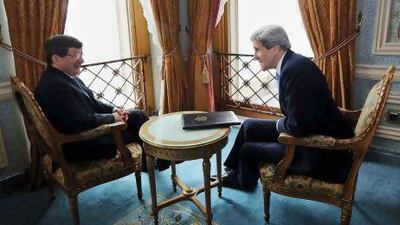ISTANBUL // The Turkish government is dragging its feet in restoring full diplomatic ties with Israeli because of domestic pressure and a concern about losing face in the Arab world, analysts say.
In a diplomatic coup engineered by Barack Obama, Israel apologised to Turkey last month for the deaths three years ago of nine Turkish activists during an Israeli special-forces raid on a flotilla bound for Gaza.
The apology, and Israel's pledge to pay damages to the victims' families, was expected to lead to a normalisation of ties.
Despite calls by US Secretary of State John Kerry for progress during his visit to Istanbul on Sunday, concrete political steps to repair relations have failed to materialise.
"Even after Israel's apology and announcement of compensation payments, Turkey does not trust the Israeli government," said Mehmet Sahin, a Middle East expert at Ankara's Gazi University.
Turkey "risks losing credibility domestically and in the Arab world" if it restores relations too quickly, he added.
One day after Mr Kerry's appeal, Turkey postponed talks with Israel about compensation for the relatives of the victims who died during the raid in May 2010 on the Gaza aid ship Mavi Marmara.
Bulent Arinc, a deputy prime minister and head of the Turkish delegation in the planned talks, said on Monday that the talks, scheduled for tomorrow, had been pushed back until April 21 or 22.
He said the talks were postponed because he would be accompanying the Turkish prime minister, Recep Tayyip Erdogan, on a visit to Kyrgyzstan and Mongolia this week.
Turkey's Anadolu news agency quoted an unnamed Israeli government official as saying that Turkey had requested the postponement because Ankara had yet to conclude its preparation.
Mr Sahin said Mr Arinc's decision to accompany the prime minister showed the Ankara government was wary of moving too quickly.
Mr Arinc announced the postponement of the talks with Israel hours after families of the Mavi Marmara victims demanded that Israel lifts its blockade of the Gaza Strip.
"We want to declare that we will not take part in compensation talks before the blockade has been lifted completely," said Musa Coas, an activist who was wounded during the Israeli attack on the ship.
Even if Turkey and Israel reach an agreement on compensation, a full recovery of relations may still be a long way off.
There have been no talks about a new exchange of ambassadors between the two countries so far.
"The Arab world wants the apology and the Gaza issue to go together," said Huseyin Oruc, a spokesman for the Foundation for Human Rights and Freedoms and Humanitarian Relief, the Islamic charity behind the Gaza mission that the Mavi Marmara was taking part in.
He added that the postponed talks between Turkey and Israel were also intended to tackle the issue of the Gaza blockade.
Mr Sahin said one reason for the Turkish government to tread carefully was an expectation in Ankara that Israel would take military action in Gaza or elsewhere in the region whenever it saw threats to its own security, whether Turkey agreed with the Israeli risk assessment or not.
"That could leave Turkey in a difficult position," said Mr Sahin. "We have three elections coming up in the next two years, so the government would like to avoid situations like this," he said, in reference to local, presidential and parliamentary elections next year and in 2015.
Given that Israel is very unpopular in Turkey, any impression given by the government that it was soft on Israel could be exploited by the opposition, which has already raised the question of whether Turkey had made secret political concessions in order to get Israel to issue its apology.
Foreign policy calculations also played a part, said Mr Sahin.
"If there is no change in Israel's policies towards Gaza and towards the [Jewish] settlements, and Turkey still moves fast in its rapprochement with Israel, then doubts will grow in the Arab world," he added.
Mr Erdogan's government has gained popular support in the Arab world in recent years because it had taken a strong stance towards Israel, accusing it of "state terror".
The Turkish prime minister was unlikely to put that reputation at risk for the sake of better ties with Israel, even if the US wanted that, said Mr Sahin.
He said that he expected Turkish-Israeli relations to be marked by "ad hoc cooperation in fields of corresponding interests" such as the conflict in Syria, where both countries are concerned about the gathering strength of militants.
"But relations will not go back to the general rapprochement of the 1990s," he said.
While progress is slow on the political and diplomatic fronts, there are signs that economic ties might heal much faster.
Basaram Ulusoy, the director of the Association of Turkish Travel Agencies, said last week that he expected up to one million tourists from Israel in Turkey this year, after bookings shot up following Israel's apology last month.
"Turkey is returning to the old days" of hosting many holiday makers from Israel, he said.
In 2008, just before political ties were thrown into crisis after Israel's 2008-2009 military campaign in Gaza, the number of Israeli tourists in Turkey was about 560,000 a year, but dropped to about 80,000 after the Mavi Marmara incident.
twitter: For breaking news from the Gulf, the Middle East and around the globe follow The National World. Follow us

